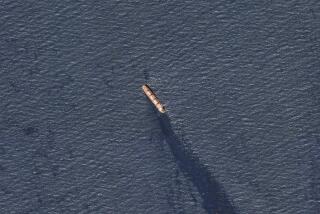How does Islamic State make money off oil fields in Syria and Iraq?
Russia has accused Turkey and its president, Recep Tayyip Erdogan, of colluding with the militant group Islamic State in an industrial-scale, illegal oil trade.
The charges, leveled this week amid escalating tensions between Turkey and Russia, highlight the militant group’s prominence as an important oil broker in war-torn Syria and the chaotic eastern areas of Iraq.
Islamic State now controls almost two-thirds of Syria’s oil production capacity, experts estimate, providing an essential source of revenue to feed its war machine.
But to what extent can Islamic State leaders operate the oil fields and get the product to market? That’s a question being pondered by the United States, which launched airstrikes against oil facilities in recent weeks to stop the extremist group from using oil revenue to finance its self-declared caliphate in Syria and Iraq.
Here’s a look at Islamic State’s involvement in the oil industry.
What oil facilities does Islamic State control?
Islamic State seized the bulk of Syria’s oil facilities when it took control of the eastern province of Dair Alzour in the summer of 2014.
By July of that year, the group had routed other Islamist factions from the area and netted the Omar oil field, the crown jewel of Syria’s oil installations. It also took the Tanak, Jafra and Ward oil fields.
Islamic State militants continue to engage in a war of attrition with pro-government forces to take the Shaer gas field and the Jazal oil field in desert areas of eastern Homs province.
The group has also threatened gas fields near Palmyra, the heart of Syria’s gas sector, according to a report issued in June by the Carnegie Endowment for International Peace.
Oil and gas production, however, is nowhere near prewar levels. Energy analysts put Syria’s oil output at 30,000 to 40,000 barrels a day, compared with 385,000 barrels daily before the war.
Gas production is down at least 40% from prewar levels, according to a report published in November by the oil industry journal Rigzone.
How does it refine, transport and sell the oil?
Most of the oil is sold to small, privately owned refineries, usually do-it-yourself operations that have sprung up near the “nodding donkey” pumps that dot the landscape in northeastern Syria.
They are operated mostly by civilians unaffiliated with Islamic State. They take the crude directly from the wellhead, refine it and sell the inferior product on black markets. They are typically local people whose prior livelihoods were destroyed by the fighting.
These civilians, analysts say, are key to the resilience of Islamic State’s oil trade: Not only do they refine and transport the oil, but they also bear the brunt of the U.S.-led coalition’s air campaign against oil infrastructure — without compensation from Islamic State.
Much of the oil never reaches external markets and is used for domestic consumption in Islamic State-controlled territories or sold to other rebel factions and the Syrian government.
However, there have been reports that some oil from Islamic State-held territory in Syria and Iraq has made its way to Jordan and Turkey.
What is the U.S.-led coalition doing to stop the oil trade?
Coalition forces recently launched Operation Tidal Wave II, meant to ramp up attacks against oil fields and tankers — targets that had been off limits to avoid civilian casualties.
The Pentagon said it had destroyed more than 300 oil tankers in Islamic State areas in the last two weeks of November.
On Thursday, the Omar oil field was struck by British warplanes, in a raid that marked Britain’s first bombing run in Syria after its Parliament overwhelmingly approved military action against Islamic State there.
How much money are we talking about?
Estimates vary but have centered on a figure of $2 million to $3 million a day. Since Russia began bombing, Russian defense officials say, that number has been halved.
Mowaffak Rubaie, a former Iraqi national security advisor, said Islamic State had raked in $800 million in 2014.
“Daesh sells Iraqi and Syrian oil in the Turkish black market at prices [that are] 50% those of the global market,” Rubaie said in a phone interview Thursday, referring to Islamic State by an Arabic acronym.
However, some analysts say estimates of Islamic State’s oil revenue are wildly exaggerated.
They cite an internal Islamic State report from February of this year with figures for Dair Alzour and surrounding areas. The report, which comes from Islamic State’s accounting department, showed less than $2 million a month in oil revenue, which formed 27% of the group’s income.
Are Turkish officials involved?
Russia says yes, although there is no hard proof.
The Russian accusations came after Turkey shot down a Russian warplane near the border with Syria last month. Erdogan has repeatedly promised to resign if the claim is true.
Nevertheless, many charge that the scale of the smuggling would not be possible without Turkish governmental sanction.
“The only borders open with Daesh are the ones with Turkey,” said Salman Khalaf, head of the Energy Commission in the Syrian Kurdish canton of Rojava.
For Rubaie, also, the case is clear.
“No insurgent group, whether it’s the Islamic State or not, can survive without a neighboring country either directly supporting it or turning a blind eye to it,” he said. “The Turks have to come clean and be on the side of counter-terrorism in the region, full stop.”
And in a telephone interview Thursday, Iraqi Oil Ministry spokesman Asim Jihad agreed that Islamic State cannot be acting alone.
“How do tens of trucks with Iraqi and Syrian oil leave the area? Where is this oil going? Who is dealing with it?” he asked.
“Daesh cannot alone deal with this large matter. There must be cooperation with other entities,” he concluded.
Aymenn Tamimi, a regional expert on militants for the Philadelphia-based Middle East Forum, offered a dissenting view.
“The fact is [that] routes for oil from Islamic State territory can go in many directions,” he said in an interview on social media Wednesday. “It doesn’t show a special collusion between one side in particular and the Islamic State.”
Bulos is a special correspondent.
More to Read
Start your day right
Sign up for Essential California for news, features and recommendations from the L.A. Times and beyond in your inbox six days a week.
You may occasionally receive promotional content from the Los Angeles Times.






